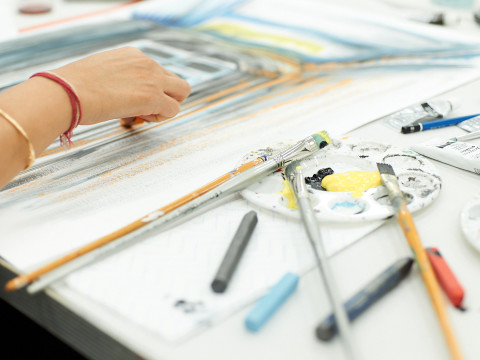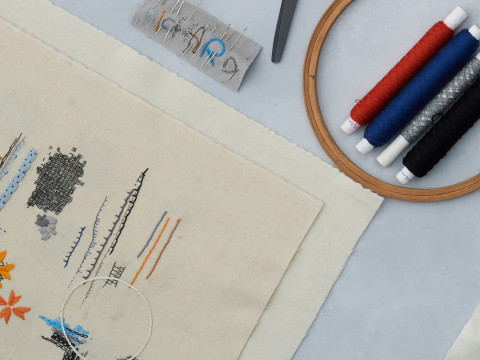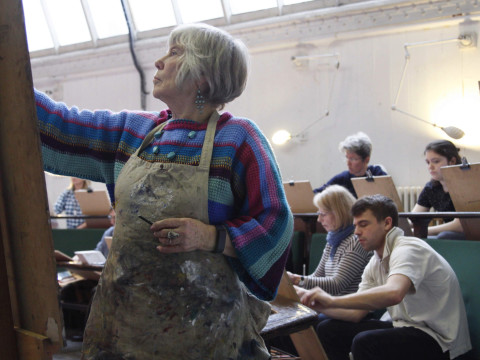
Essential forms: antiquities and universal motifs
Two-day art history and theory course
14 April 2018 10am - 5pm15 April 2018 10am - 5pm
The Life Room, The Royal Academy Schools
£360. Includes all materials, light refreshments at the beginning of each day and wine reception.
Terms and conditions
Leading art-world experts and international scholars introduce and de-mystify the fascinating world of antiquities and the ancient arts – with a view to the timeless forms, ideas and universal motifs that are so influential across the arts and culture up to the present day.
Western civilisation is shaped by the ideas, intellectual and visual, of the ancients; the canon of Western art and architecture is founded on the arts of antiquity. Everywhere we see references to them, whether in the works of Michelangelo or Modigliani, the architectural details of our buildings, or the design of furniture and the everyday objects in our homes. We find, in antiquity, essential forms and timeless motifs that have been used and re-used by artists and craftsmen over centuries. These have had a profound influence on the craftsmen of the middle ages through to the renaissance, when rediscoveries of the ancient masterpieces inspired Leonardo Da Vinci and Michelangelo.
Ideas, stories and aesthetic forms from ancient cultures have motivated the modern, western avant-garde artists of the 20th century, including Picasso, Matisse and Albers, and in turn, radically influenced contemporary artists up to the present day. This course coincides with the research project on Modern Classicisms and The Classical Now exhibition at King’s College London, which aims to explore the enduring legacy of ancient Greek and Roman visual culture in contemporary art – as ideal, antitype or point of departure.
And yet in spite of their universal influence, the arts of the ancient world and antiquities remain little understood, often misrepresented and mysterious to us. The course will provide an overview of selected moments in the area we call antiquities: a vast field spanning over 5000 years and several continents, including the civilisations of Ancient Greece and Rome, of Mesopotamia and the ancient Near East, ancient Egypt, and the cultures of the Mediterranean basin including the Celts, Anglo-Saxons and Vikings. Experts will offer insights into key objects as well as the context of the civilisations that produced them. We will consider the relevance of these objects, forms and ideas today, and what we learn from them – from the deciphering of the earliest form of writing to the discovery of the Staffordshire Hoard.
This course is notable in involving international experts and scholars who have had experience of both researching and writing about existing and newly discovered objects from the ancient world, as well as, critically, handling and curating them. Focusing on object-based learning, this course will provide detailed discussion on the protection of cultural heritage or restitution issues. Experts will share their knowledge and passion for both the history and the material culture with a view to their contemporary significance and ideas they embody.
£360. Includes all materials, light refreshments at the beginning of each day and wine reception.
Terms and conditions
About the course
This course provides an introductory overview of antiquities: a vast field spanning over 5,000 years and several continents including the civilisations of ancient Greece and Rome, of Mesopotamia and the ancient Near East, ancient Egypt, and the cultures of the Mediterranean basin including the Celts, Anglo-Saxons and Vikings.
The course provides an opportunity to explore art history through its material culture and learn from leading international experts and scholars, as well as art world practitioners who have direct experience of handling, exhibiting and curating ancient objects as well as practical knowledge of the market, trade and collecting.
This course is suitable for all levels and those with general, as well as specific, interests in antiquities.
This course is for you if:
• You are interested in an historical introduction and overview of the arts of the ancient world across regions and cultures
• You are interested in some of the universal themes emerging from the ancient world with reference to culture today
• You have a broad interest in the collecting and trade of antiquities
• You are interested in the curating, display and exhibition of antiquities and ancient art
• You enjoy working in a peer-group environment and are interested in practical, contextual, field, and object based knowledge as well as art history
Minimum age 18
Discussion of the ancient arts and antiquities is brought to life in the unique and historic settings of the Life Room of the RA Schools.
The Life Room traditionally houses a selection of historic plaster casts from the RA's Collection after important Classical and Renaissance sculptures. These include a figure of the Esquiline Venus and busts of emperors and philosophers as well as the Head of Dawn after Michelangelo and of St George after Donatello. All of the casts were collected over the years for use in the RA Schools where – from 1768 up until the 20th century – students began their course by drawing the plaster casts before they were allowed to progress to the life class and eventually to painting.
This important space was designed in the 1860s when the galleries and schools were first constructed; purpose-built to accommodate the study of the human form in art. The semi-circular seating arrangement is based on an ancient design and can trace its British history back to the 1730s and Hogarth’s Academy in St Martin’s Lane. The directional light is also of ancient design and is used (then as now) to aid the delineation of the figure’s musculature – significantly enhancing the use and study of colour and light in art.
Speakers

Judith Nugée is a specialist in antiquities who has been working in the field for over 30 years. Captivated by the ancient world, Judith read Literae Humaniores (Classics) at Oxford University. On leaving university, Judith joined Christie’s, where she became Head of the Antiquities Department. She remained a senior consultant with Christies until 2009 when she founded Hornsby + Nugée Ltd with her colleague Sarah Hornsby, Director of Antiquities at Christies at the time.
Judith carries out independent commercial, academic and educational work, which includes working with private clients as well as public and private institutions. Her work includes research of objects, advising for acquisition or sale, valuations and acting as agent. Judith has lectured widely on antiquities, the marketplace, and history of collecting on postgraduate programmes, as well as taking specialist educational tours in museums with an object and context-based approach.
Judith is an independent specialist for the British Museum’s treasure valuations committee, providing valuations for the UK government as well as for Scotland and Ireland. She has been involved in the research, cataloguing and valuation of major historic and cultural finds, including the acclaimed Staffordshire Hoard. She served for 10 years on the council of the British Museum Friends, and is a founder and director of Hornsby + Nugée Antiquities consultants which advises on all aspects of the Antiquities market.
Judith will be joined by a number of expert guest speakers from antiquities and the art world.

Irving Finkel
Philologist and Assyriologist
British Museum
Dr. Finkel is the curator in charge of cuneiform inscriptions on tablets of clay from ancient Mesopotamia, of which the Middle East department of the British Museum has the largest collection – some 130,000 pieces – of any modern museum. This work involves reading and translating all sorts of inscriptions, sometimes working on ancient archives to identify manuscripts that belong together, or even join to one another. Museum work also includes working with children and adults to promote greater familiarity with the ancient Middle East, by means of lectures, workshops and media activity. Dr Finkel specialises in ancient Mesopotamian medicine and magic and is also interested in literature, religion and the history of ideas in this part of the world. He is also interested in the history of board games throughout the world, and especially the preservation of traditional board games in many non-western societies.

Florent Heintz
Head of Department
Ancient Sculpture and Works of Art
Sotheby’s
Dr. Florent Heintz joined Sotheby’s Ancient Sculpture & Works of Art department in 2001. Prior to coming to Sotheby's, Dr Heintz worked as Keeper of the collection of ancient coins at the Fogg Art Museum and as Curatorial Assistant at the Worcester Art Museum, Worcester, Massachusetts. His publications include a monograph, Simon le Magicien (1997), several articles in academic journals such as Zeitschrift für Papyrologie und Epigraphik, the Journal of Roman Archaeology and the American Journal of Numismatics, and contributions to exhibition catalogues such as his object entries and essay on Roman Magic in Antioch: The Lost Ancient City (Princeton University Press, 2000). Dr Heintz obtained a Master's degree in Philosophy from the University of Lyon, France, a Doctorate of Theology degree from the University of Strasbourg, France, and a PhD in Classical Archaeology from Harvard University.

Martin Clist
Managing Director
Charles Ede Ltd
Since early 2014 Martin Clist, has been the Managing Director of Charles Ede (established 1971). He studied Fine Art at university, completing his postgraduate masters at the Slade School, London. He has worked in the London art world for more than three decades, initially with Nick Serota at the Whitechapel Gallery, before moving to the commercial world, firstly at Waddington Galleries and later Karsten Schubert. For 17 years he was at Rupert Wace Ancient Art, followed by four years with Rossi & Rossi, leading dealers in Tibetan art.

Michael Squire
Reader in Classical Art
King’s College London.
Dr Michael Squire' s first degree was in Classics and his MPhil in Classical Archaeology (both at Trinity College, Cambridge). After a year as Frank Knox Memorial Fellow at Harvard, specialising in comparative literature, he returned to Cambridge and completed a PhD on theories of word and image in Graeco-Roman antiquity (2006). Michael has written and edited ten books, including The Art of the Body: Antiquity and its Legacy(Oxford University Press/ I.B. Tauris, 2011); he is a NADFAS lecturer, and has lectured for numerous museums, heritage partners and travel companies. He was elected to the Wissenschaftskolleg zu Berlin in 2012, and has also been awarded a 2012 Philip Leverhulme Prize for his research into Classics and Classical art history.
Michael Squire leads the multi-dimensional research project Modern Classicism at Kings College London, which runs August 2017 to July 2018 and sets out to explore research questions including: What is it about ancient Greek and Roman art that still captivates and provokes the modern imagination? How can contemporary art help us to see the classical tradition with new eyes? And what can modern-day responses tell us about our own cultural preoccupations in the 21st century?

Our courses and classes programme
Our programme of short courses and classes offers the opportunity to explore a range of subjects, led by expert tutors and practising artists.
Related events
 Short courseFree
Short courseFreeThe Primary Art School
9 January - 12 June 2025
 Short course
Short courseBotanical art
11 March - 8 April 2025
 Short course
Short courseExploring ink: method and imagination
29 March - 30 March 2025
 Short course
Short courseDepicting the figure: Renaissance to Modernism
29 April - 27 May 2025
 Short course
Short courseRevolutionaries and Romantics: art and literature in France
17 May - 18 May 2025
 Short course
Short courseOil painting: techniques and discovery
17 May - 18 May 2025
 Short course
Short courseSketch with stitch
21 June - 22 June 2025
 Short course
Short courseConnoisseurship summer school: who painted what, when and how to tell
1 July - 5 July 2025
 Short course
Short courseLife drawing summer school
8 July - 12 July 2025
 Short course
Short courseDrawing with anatomy
15 July - 19 July 2025
 Short course
Short courseExpressive life drawing: observation and imagination
15 July - 19 July 2025
 Short course
Short courseLandscapes: van Gogh and his influence
2 September - 6 September 2025